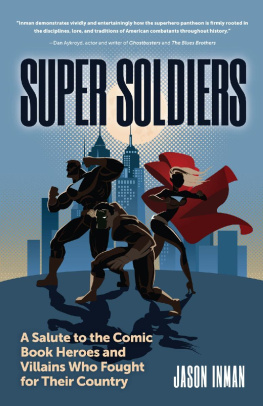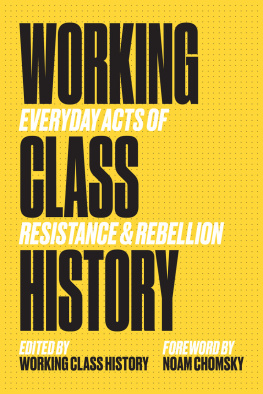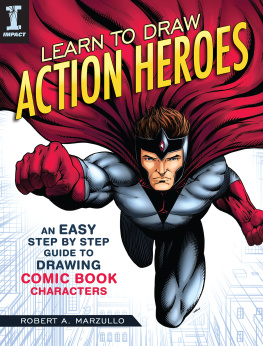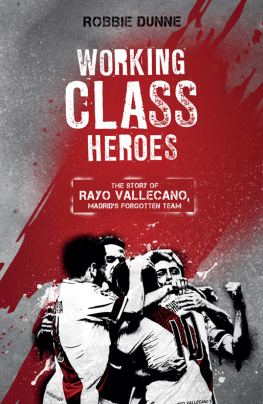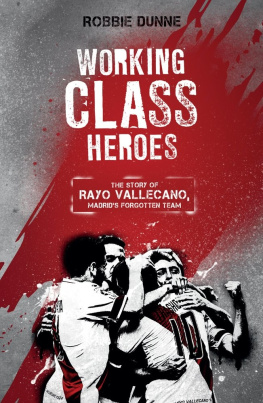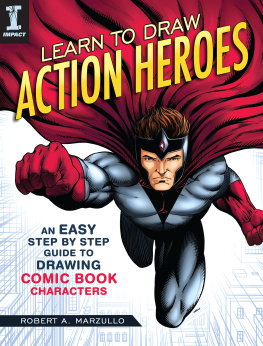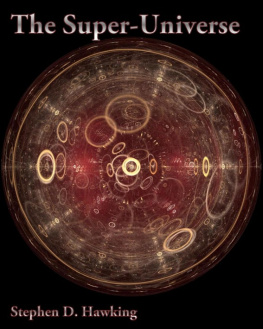WORKING-CLASS COMIC BOOK HEROES

www.upress.state.ms.us
The University Press of Mississippi is a member of
the Association of American University Presses.
Copyright 2018 by University Press of Mississippi
All rights reserved
Manufactured in the United States of America
First printing 2018
Library of Congress Cataloging-in-Publication Data
Names: Di Paolo, Marc, editor.
Title: Working-class comic book heroes : class conflict and populist politics in comics / edited by Marc DiPaolo.
Description: Jackson : University Press of Mississippi, [2018] | Includes bibliographical references and index. |
Identifiers: LCCN 2017048412 (print) | LCCN 2017048858 (ebook) | ISBN 9781496816658 (epub single) | ISBN 9781496816665 (epub institutional) | ISBN 9781496816672 (pdf single) | ISBN 9781496816689 (pdf institutional) | ISBN 9781496816641 (hardcover : alk. paper) | ISBN 9781496818188 (pbk. : alk. paper)
Subjects: LCSH: Comic books, strips, etc.History and criticism. | Working class in literature. | Social conflict in literature. | Populism in literature. | Superheroes in literature. | Working class authors.
Classification: LCC PN6714 (ebook) | LCC PN6714 .W67 2018 (print) | DDC 741.5/9dc23
LC record available at https://lccn.loc.gov/2017048412
British Library Cataloging-in-Publication Data available
For Dad
CONTENTS
ACKNOWLEDGMENTS
I would like to thank Steve Gooch for encouraging me to produce a follow-up to War, Politics and Superheroes: Ethics and Propaganda in Comics and Film (2011)a monograph with a title that upsets him because it is missing an Oxford comma. This volume, which stands on its own, is a continuation of my work, nonetheless, and exists thanks to his prodding. In addition, I am grateful to Will Brooker, Tracy Floreani, and Karen Green for their help finding contributors for this anthology.
I am also in debt to Michele Fazio, an invaluable manuscript reviewer, who provided me with much-needed assistance, information, and encouragement.
Finally, I want to express my love and thanks to my family, including my wife, Stacey, my children, Keira and Quentin, my brother Brian, and my parents, Ted and Cathy.
WORKING-CLASS COMIC BOOK HEROESINTRODUCTION
Cultivating Empathy: The Subversive Potential of Populist Comic Books
Marc DiPaolo
Working Class Hero is a diagnosis song. [John] Lennon sits you down on one of those uncomfortable tables in the examining room and explains the lab reports. The weariness in Lennons voice is that of a doctor whos seen too many like you and has grown tired of giving the bad news. For Lennon, the working class is a social conditioning that starts at birth and ends with the eternal promise we still cling to in adulthood and clutch as we die: the possibility of climbing the ladder, punching through the glass ceiling, achieving the American Dream and becoming like the folks on the hill. If theres any doubt this is a relentless and exhausting promise, the songs repetitive structure and funereal pace make those qualities felt. If the drudgery doesnt kill you, the insanity will.
ROBERT LOSS, John Lennons Working-Class Hero: Boundaries, Mobility, and Honesty (2016)1
This anthology is about the working-class comic book heroessome super-powered, some notwho populate serialized comic book narratives that have been adapted into recent, high-profile films and television shows. These figures are analyzed and deconstructed; their roles as fictional stand-ins for real-world blue-collar figures are considered within a broader cultural and historical context, as well as placed within the shifting conventions of genre fiction. The writers and artists who created these characters are also discussed, most notably Jack Kirby, the working-class Jewish artist who created several of the most recognizable Everyman comic book heroes, including steroid-enhanced Nazi-smasher Captain America and the cigar-chomping Golem Ben Grimm, a.k.a. the Thing.
Those who find it hard to believe that comic books, especially superhero comic books, could possibly treat class issues seriously are not necessarily wrong. Many comic book narratives take place in a heavily mythologized, escapist America free of social-class divisions, or in fantastical environments, such as the Justice League Watchtower orbiting the Earth like the Island of Laputa floating above Balnibarbi. However, some comic books are known for confronting issues of class and race frequently. Among the most notable of these are Daredevil, Luke Cage, and Captain Americaall of which feature significantly in these pagesas well as Dwayne McDuffies Damage Control and Gail Simones short-lived tour de force The Movement (2014), which is a commentary on Occupy Wall Street that prophetically predicted many of the core conflicts and issues of Black Lives Matter. Those who read these comics probably assumed, with good reason, that they would never be adapted into films or television shows designed for mass consumption. Furthermore, fans probably assumed that, should such comics ever be adapted, they would be stripped of all their social import and turned into purely escapist fare. And yet, against all possible expectations, the Marvel Cinematic Universe adaptations of the comic books Daredevil, Luke Cage, and Captain Americaas well as Damage Controls inclusion in Spider-Man: Homecoming (2017)have been particularly adept at crystalizing the working-class themes found in the comic books instead of eliding them. In some cases the adaptations have even been more effective at depicting class issues than the comics, which is not something that veteran comic book scholars and fans would necessarily expect, since film adaptations of comic books have tended to be more politically simplistic and reactionary than their source material. Oddly, multimedia heroic narratives such as Daredevil and Captain America sometimes offer more-insightful cultural commentary than the so-called news analysis provided by the corporate-owned twenty-four-hour infotainment channels and tabloid newspapers. This book considers, in detail, how comic books offer sometimes surprisingly insightful cultural commentaries about class issues in the United States and Great Britainand why their representations of working-class characters and their lives are important to study.
Thanks to the rise of the superhero in the multimedia landscape and its dominance of the motion picture industry since 2000and of (web) television since 2015the world of scholarly publishing has seen a notable uptick in monographs and anthologies centered around the study of superheroes, especially those that examine representations of the war on terror in heroic fiction and those that examine the treatment of identity politics in multimodal superhero adventures. And yet, while there have been many excellent scholarly works that have considered issues of race and gender in superhero narrativesincluding Adilifu Namas Super Black: American Pop Culture and Black Superheroes (2011) and Carolyn Coccas Superwomen: Gender, Power, and Representation (2016)and while Ramzi Fawazs The New Mutants: Superheroes and the Radical Imagination of American Comics (2016) addresses class issues, this is the first entire book to explore issues of socioeconomic class, cultural capital, and economics in comic book heroic fiction.2




